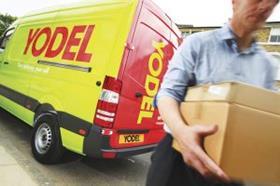Parcels expert Frank Proud argues that the embattled parcels carrier has a bright future ahead of it.
While the full story of peak 2017 has not yet been told, it looked like, this year, Yodel had sailed through the Christmas period with only positive headlines.
The company announced it had seen a 20% improvement in its TrustPilot rating between Black Friday and Christmas Day, and that 82% of customers had reported a “good” or “great” delivery experience via its feedback programme.
However, there was a jolt earlier this month with the announcement of the departure of its CEO, Mike Cooper (pictured), who will be returning to the passenger transport sector as the new head of Eurostar.
This inevitably put Yodel in the spotlight once again. We have sometimes been asked whether we think the company has a future in the competitive UK delivery market. The answer, of course, is that it depends.
Financial performance
Yodel’s financial performance since its formation from the combination of Home Delivery Network Limited (HDNL) and DHL Domestic in 2010 has been such that, had it been a standalone commercial entity, it is unlikely it would have survived.
Cumulative losses of almost £500m since the merger mean that it has had a requirement for funding from its owners, the Barclay brothers, for the past seven years. However, the question of whether Yodel has a secure future is not one that can be answered on purely commercial grounds.
There are four good reasons to believe that Yodel will continue to be a fixture in the market.

Firstly, and most importantly, it might be taking a while, but the company is visibly being turned around. Yodel might have represented a very large pit for its owners to sink their money into but, certainly since the arrival of Dick Stead as executive chairman in 2012, it has not been a bottomless one.
Each set of results has shown progress being made, with losses reducing, market positioning becoming clearer and initiatives implemented.
Yodel’s misfortune has been that its turnaround task has been made ever harder because the market has not stood still while it has gone about fixing its issues: rather its competitors, in particular Hermes, have continued to innovate and to raise the bar for Yodel to get back on terms.
Secondly, Yodel and its predecessor businesses, Home Delivery Services and White Arrow, owe their existence not to their own standalone commercial attractiveness, but to their strategic importance to much larger businesses.
That is, to the big home shopping groups with which they have always been associated – originally Littlewoods and GUS respectively, and now Shop Direct – for whom delivery capability is critical.
The biggest recent threat to Yodel’s future might have been in the middle of last year. Press reports then suggested that the Barclays were close to selling Shop Direct to private equity investors but could not agree a price.
Had the sale gone through (and had Yodel not been included in it) then the strategic case for them continuing to fund Yodel would have disappeared.
Following the failure of that deal, Shop Direct was refinanced last October via a £700m high-yield bond issue, which suggested that sale plans were no longer an immediate prospect..
The City Link effect
Thirdly, as Rentokil demonstrated during its painful ownership of City Link after the Target merger, exiting from a parcels business in the absence of a buyer (there are no very obvious candidates), is not necessarily straightforward. Faced with heavy ongoing losses, Rentokil could not close down City Link because the exit costs, including unexpired leases and redundancy payments, were always far higher than the trading losses.

Finally, the level of investment that has been made in Yodel does not suggest a lack of commitment to its future. New depots have been opened, information systems been upgraded, processes have been re-engineered and, in the run-up to peak, the business control tower was opened to co-ordinate all operations.
In addition, a succession of managers with impressive experience at leading organisations has been recruited. It’s hard to imagine that a series of people with such strong CVs would have been persuaded to join the company had they not received convincing answers to the question of Yodel’s future.
This includes new CEO, Andrew Peeler, who joined the company in September as chief financial officer.
Work in progress
Yodel’s turnaround has further to go. It still does not have as clear a market positioning as its rivals such as Hermes, DPD and Royal Mail. While peak volumes were up, its latest accounts show it is still loss-making, and, while customer satisfaction metrics have improved significantly, its brand still has negative associations for many consumers.
Would the Barclays have backed Yodel when it made its first big losses in 2011 if they knew that they would still be funding it seven years and half a billion pounds later? Possibly not, but those losses are sunk, and having seen it through much worse times, it’s hard to see why current performance would cause them to pull the plug now, given the progress that has been made.
- Frank Proud is the founder and director of market analyst Apex Insight.














